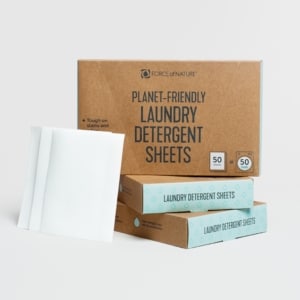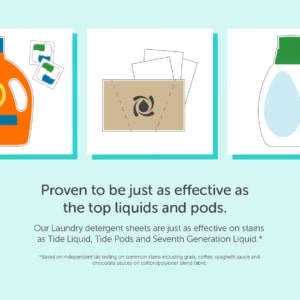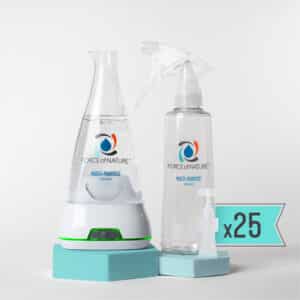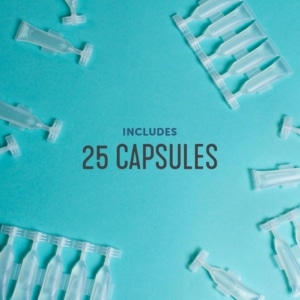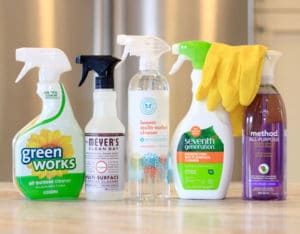
If you have a curious toddler, eager young children who can’t pass up a good spray bottle, or a helpful teenager (congratulations!), you’re probably buying natural cleaning products. The toxic chemicals in conventional cleaners are linked with all kinds of health issues like reproductive toxicity, cancer, asthma, allergies, burns & poisonings. The bad news is that many natural cleaners are not nearly as safe as most parents think! Here’s what you need to know to separate the truths from the myths in your pursuit of safe, chemical free cleaners.
Myth #1: “Natural” cleaners are toxic chemical free cleaners.
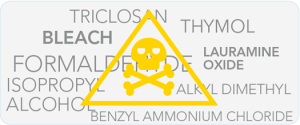 It’s hard to believe, but there are no federal regulations that dictate standards for products labeled as “natural”. So while you may think “natural” means no dangerous chemicals, that’s actually not at all the case. While many natural cleaners may be somewhat safer than conventional cleaners, the reality is that many products labeled as “natural” are actually not toxic chemical free cleaners at all. Products from brands like Seventh Generation, Method, Mrs. Meyers, Honest Company & Green Works all contain toxic chemicals like allergens, skin and respiratory irritants.
It’s hard to believe, but there are no federal regulations that dictate standards for products labeled as “natural”. So while you may think “natural” means no dangerous chemicals, that’s actually not at all the case. While many natural cleaners may be somewhat safer than conventional cleaners, the reality is that many products labeled as “natural” are actually not toxic chemical free cleaners at all. Products from brands like Seventh Generation, Method, Mrs. Meyers, Honest Company & Green Works all contain toxic chemicals like allergens, skin and respiratory irritants.
Myth #2: Natural cleaning products are safe.
In fact, many cleaners labeled as “natural” contain dangerous fragrances, dyes, preservatives, allergens & irritants. Check out these surprising safety ratings from the Environmental Working Group (EWG) that show “natural” brands earning the same safety ratings as conventional cleaners:

So as much as you might want your children to help you clean, you can’t be sure your “natural” cleaning product is actually safe enough to use around them.
Myth #3: The ingredient list actually tells you what’s in the product.
 Unlike the manufacturers of food, beverages, cosmetics & personal care products, manufacturers of cleaning products are not required to disclose all of their products’ ingredients on their packaging labels. Shocking, right? So how do you hunt down the toxic chemical free cleaners? First, look for specificity. Many manufacturers use vague terms that can hide all sorts of toxic ingredients. For example “fragrance” can actually mean a cocktail of undisclosed ingredients, when even natural fragrances can cause allergic reactions. Other vague descriptions to watch for are “surfactants“, “cleaning agents” or “preservatives”, where the lack of specificity means you can’t easily research the ingredients yourself. An example is methylisothiazolinone, which is often just labelled as “preservative”. It’s as scary as it is unpronounceable, given its association with lung toxicity, allergies, and possible neurotoxicity.
Unlike the manufacturers of food, beverages, cosmetics & personal care products, manufacturers of cleaning products are not required to disclose all of their products’ ingredients on their packaging labels. Shocking, right? So how do you hunt down the toxic chemical free cleaners? First, look for specificity. Many manufacturers use vague terms that can hide all sorts of toxic ingredients. For example “fragrance” can actually mean a cocktail of undisclosed ingredients, when even natural fragrances can cause allergic reactions. Other vague descriptions to watch for are “surfactants“, “cleaning agents” or “preservatives”, where the lack of specificity means you can’t easily research the ingredients yourself. An example is methylisothiazolinone, which is often just labelled as “preservative”. It’s as scary as it is unpronounceable, given its association with lung toxicity, allergies, and possible neurotoxicity.
Myth #4: Botanical ingredients are safe.
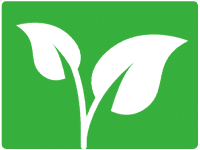 Don’t be fooled by safe-sounding botanical-based ingredients like thymol, which is actually a known allergen. When you see a natural or botanical ingredient, do your own research because many aren’t as safe as you think. For example, citrus and pine oil cleaners emit chemicals called terpenes that can form formaldehyde when they react with ozone in the air. Or some essential oils contain substances like eugenol and limonene which can trigger allergic reactions.
Don’t be fooled by safe-sounding botanical-based ingredients like thymol, which is actually a known allergen. When you see a natural or botanical ingredient, do your own research because many aren’t as safe as you think. For example, citrus and pine oil cleaners emit chemicals called terpenes that can form formaldehyde when they react with ozone in the air. Or some essential oils contain substances like eugenol and limonene which can trigger allergic reactions.
Myth #5: The government tests cleaning products for safety.
Ready for a jaw-dropper? Out of some 62,000 chemicals approved for use in the US, only about 300 have actually been tested for safety. The last time the law governing the safety of chemical products was changed, the cost of gas was $.59 a gallon and the average cost of a new house was $43,400. That would be 1976. Scary! That means the onus is really on you to do your own research. The good news is that an excellent resource for researching cleaning product health and environmental safety is the Environmental Working Group, which has a searchable database of products.
Remove the Guesswork
Or you can stop worrying about deciphering ingredient labels and instead try Force of Nature, which uses electricity to convert salt, water & vinegar into a cleaner and EPA registered disinfectant as effective as bleach – but with no harmful chemicals. No dyes, fragrances, preservatives, allergens or irritants, no mysterious ingredient list. And it powers through grease, grime, soap scum & odors as effectively as top conventional brands but without the nasty chemicals you don’t want around your children & pets. It’s even gentle on skin, with no toxic residues to harm the little hands in your home, no rinsing needed. Force of Nature is actually the only EPA registered disinfectant that you can make on your kitchen countertop. It kills 99.9% of viruses and bacteria and meets EPA standards as a Hospital-Grade Disinfectant. Force of Nature is also on EPA’s list N, the disinfectants approved for use against SARS-CoV-2, the cause of COVID-19, and EPA expects all products on List N to kill all strains and variants of SARS-CoV-2. You can learn more about Force of Nature’s technology called electrolyzed water or how Force of Nature kills viruses & bacteria. And if you want to dig in even more, we’ve also got the scoop on how Force of Nature is safe to use on virtually any surface in your home, and about how Force of Nature actually works.
